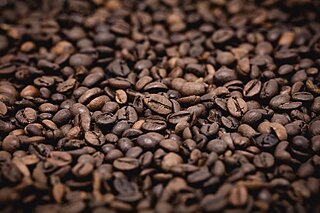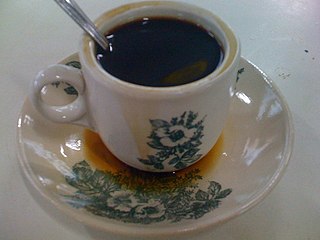Related Research Articles

Fair trade is an arrangement designed to help producers in developing countries achieve sustainable and equitable trade relationships. The fair trade movement combines the payment of higher prices to exporters with improved social and environmental standards. The movement focuses in particular on commodities, or products that are typically exported from developing countries to developed countries but is also used in domestic markets, most notably for handicrafts, coffee, cocoa, wine, sugar, fruit, flowers and gold.

The cocoa bean or simply cocoa, also called the cacao bean or cacao, is the dried and fully fermented seed of Theobroma cacao, from which cocoa solids and cocoa butter can be extracted. Cocoa beans native to the Amazon rainforest are the basis of chocolate, and Mesoamerican foods including tejate, an indigenous Mexican drink that also includes maize, and pinolillo, a similar Nicaraguan drink made from a cornmeal & cocoa powder.

Coffee is a drink prepared from roasted coffee beans. Darkly colored, bitter, and slightly acidic, coffee has a stimulating effect on humans, primarily due to its caffeine content. It has the highest sales in the world market for hot drinks.

The Fairtrade Foundation is a charity based in the United Kingdom that aims to empower disadvantaged producers in developing countries by tackling injustice in conventional trade, in particular by promoting and licensing the Fairtrade Mark, a guarantee that products retailed in the UK have been produced in accordance with internationally agreed Fairtrade standards. The foundation is the British member of FLO International, which unites FLO-CERT, 25 National Fairtrade Organisations and 3 Producer Networks across Europe, Asia, Latin America, North America, Africa, Australia and New Zealand.
Keurig Dr Pepper Inc., formerly Green Mountain Coffee Roasters (1981–2014) and Keurig Green Mountain (2014–2018), is a publicly traded American beverage and coffeemaker conglomerate with headquarters in Burlington, Massachusetts. Formed in July 2018 with the merger of Keurig Green Mountain and Dr Pepper Snapple Group, Keurig Dr Pepper offers over 125 hot and cold beverages. The company's Canadian business unit subsidiary operates as Keurig Dr Pepper Canada.

Coffee is a popular beverage and an important commodity. Tens of millions of small producers in developing countries make their living growing coffee. Over 2.25 billion cups of coffee are consumed in the world daily that amounts to 2.5 cups of coffee consumed per person on average. Over 90 percent of coffee production takes place in developing countries—mainly South America—while consumption happens primarily in industrialized economies. There are 25 million small producers who rely on coffee for a living worldwide. In Brazil, where almost a third of the world's coffee is produced, over five million people are employed in the cultivation and harvesting of over three billion coffee plants; it is a more labor-intensive culture than alternative cultures of the same regions, such as sugar cane or cattle, as its cultivation is not automated, requiring frequent human attention.

The International Fairtrade Certification Mark is an independent certification mark used in over 50 countries. It appears on products as an independent guarantee that a product has been produced according to Fairtrade political standards.

Fairtrade Canada, formerly TransFair Canada, is a national non-profit certification and public education organization promoting Fairtrade certified products in Canada to improve the livelihood of developing world farmers and workers. It is the Canadian member of FLO International, which unites 24 fair trade producer and certification initiatives across Europe, Asia, Latin America, North America, Africa, Australia and New Zealand.
The fair trade movement has undergone several important changes like the operation for ten thousand villages to open their businesses since early days following World War II. Fair trade, first seen as a form of charity advocated by religious organizations, has radically changed in structure, philosophy and approach. The past fifty years have witnessed massive changes in the diversity of fair trade proponents, the products traded and their distribution networks.
The Oromia Coffee Farmers’ Cooperative Union (OCFCU) is a smallholder farmer-owned cooperative union based in the Oromia region of Ethiopia. The region is characterized by its unique native vegetation and tropical climate conducive to coffee bean growth. OCFCU is a democratic, member-owned business operating under the principles of the International Cooperative Alliance and Fair trade, and the Union plays a central role in the Ethiopian coffee marketing chain. The members of OCFCU grow, process, and supply organic Arabica coffee for export.
Creating shared value (CSV) is a business concept first introduced in a 2006 Harvard Business Review article, Strategy & Society: The Link between Competitive Advantage and Corporate Social Responsibility. The concept was further expanded in the January 2011 follow-up piece entitled Creating Shared Value: Redefining Capitalism and the Role of the Corporation in Society. Written by Michael E. Porter, a leading authority on competitive strategy and head of the Institute for Strategy and Competitiveness at Harvard Business School, and Mark R. Kramer, of the Kennedy School at Harvard University and co-founder of FSG, the article provides insights and relevant examples of companies that have developed deep links between their business strategies and corporate social responsibility (CSR). Porter and Kramer define shared value as "the policies and practices that enhance the competitiveness of a company while simultaneously advancing social and economic conditions in the communities in which it operates", while a review published in 2021 defines the concept as "a strategic process through which corporations can turn social problems into business opportunities".

Indonesia was the fourth-largest producer of coffee in the world in 2014. Coffee cultivation in Indonesia began in the late 1600s and early 1700s, in the early Dutch colonial period, and has played an important part in the growth of the country. Indonesia is geographically and climatologically well-suited for coffee plantations, near the equator and with numerous interior mountainous regions on its main islands, creating well-suited microclimates for the growth and production of coffee.

Fair trade coffee is coffee that is certified as having been produced to fair trade standards by fair trade organizations, which create trading partnerships that are based on dialogue, transparency and respect, with the goal of achieving greater equity in international trade. These partnerships contribute to sustainable development by offering better trading conditions to coffee bean farmers. Fair trade organizations support producers and sustainable environmental farming practices and prohibit child labor or forced labor.
Sustainable coffee is a coffee that is grown and marketed for its sustainability. This includes coffee certified as organic, fair trade, and Rainforest Alliance. Coffee has a number of classifications used to determine the participation of growers in various combinations of social, environmental, and economic standards. Coffees fitting such categories and that are independently certified or verified by an accredited third party have been collectively termed "sustainable coffees". This term has entered the lexicon and this segment has quickly grown into a multibillion-dollar industry of its own with potentially significant implications for other commodities as demand and awareness expand.
Sustainability standards and certifications are voluntary guidelines used by producers, manufacturers, traders, retailers, and service providers to demonstrate their commitment to good environmental, social, ethical, and food safety practices. There are over 400 such standards across the world.
Sustainability marketing myopia is a term used in sustainability marketing referring to a distortion stemming from the overlooking of socio-environmental attributes of a sustainable product or service at the expenses of customer benefits and values. Sustainability marketing is oriented towards the whole community, its social goals and the protection of the environment. It requires the engagement of national and local governments, organisations and population as well as the necessary capital. The idea of sustainability marketing myopia is rooted into conventional marketing myopia theory, as well as green marketing myopia.

Kopi, also known as Nanyang coffee, is a traditional coffee beverage found in several Maritime Southeast Asian nations. Often brewed to be highly caffeinated in strength, it is commonly served with sugar and/or milk-based condiments. This drink originated from the British Malaya era, with Hainanese cultural roots. The name of the drink is derived from the Malay term for coffee. The term Nanyang, which means "South Sea" in Mandarin, refers to Maritime Southeast Asia. Kopi culture vocabulary is grounded in Hokkien dialect as a result of historical immigration to Maritime Southeast Asia from the Minnan region in the south-eastern part of Fujian Province in Southeastern Mainland China. The beverage is usually served in coffee shops, Hawker centres and kopitiams across the region.

Union Hand-Roasted Coffee is a privately owned British coffee roasting business based in East London, United Kingdom. The company was founded in 2001 by Jeremy Torz and Steven Macatonia. Coffee House says the company "effectively bridges the definitions of independent and mainstream" as they work according to craft principles, but also sell their products in supermarkets.
Globalization of supply chains and pressure to lower production costs have negatively impacted environments and communities around the world, especially in developing nations where production of high demand goods is increasingly taking place. Since the 1990s, awareness of these negative impacts has grown, leading stakeholders to push companies to take responsibility and actively work to improve the sustainability of their supply chains. It has come to be understood that a company is only as sustainable as the start of its supply chain, bringing about the need for sustainable sourcing. Sustainable sourcing refers to the inclusion of social, environmental, and economic criteria in the sourcing process.
References
- Schalekamp, M. (2012) Max Havelaar, 2.0, NRC Handelsblad. 30 November 2012,
- Porter, M.E. en Kramer M.R. (2011) "Creating Shared Value", Harvard Business Review, January 2011